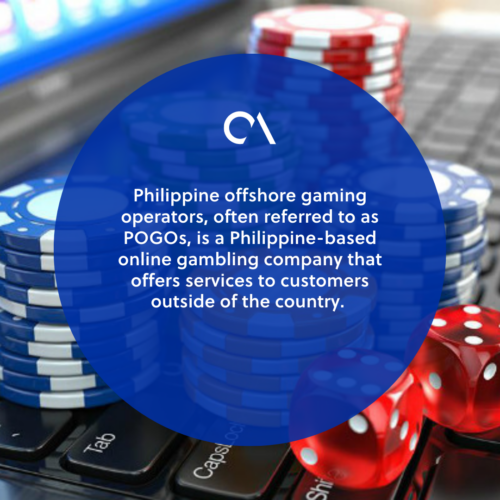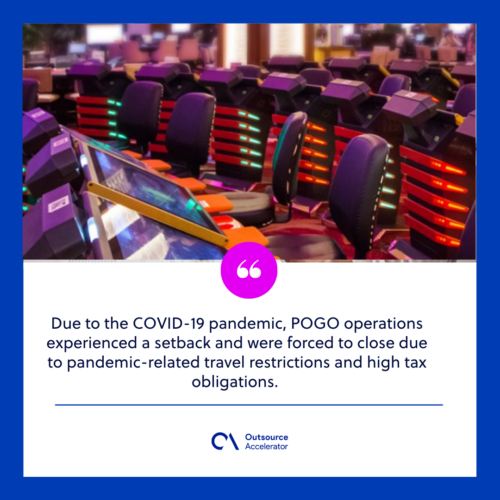Philippine offshore gaming operators (POGO)
Definition
What are Philippine Offshore Gaming Operators (POGO)?
Philippine Offshore Gaming Operators, often referred to as POGOs, are Philippine-based online offshore gambling companies that offer services to customers outside of the country.
POGOs are registered ad licensed by the Philippine Amusement and Gaming Corporation (PAGCOR) in order to operate legally. They are the only casino industry classified under the business processing outsourcing (BPO) sector.
In simple terms, a POGO is an online casino game that uses networks and software over the internet. Players make bets and receive payouts through e-transactions.
According to ABO Law firm, the Philippine Offshore Gaming Operators (POGOs) consist of three categories:
- E-casino – It is often referred to as internet casino; a type of online gambling that operates real-time casinos and usually caters to a random number of games.
- Sports betting – This is a form of gambling that involves predicting the results and placing a bet on a particular sporting event.
- Sportsbetting on Regulated Wagering Events (SBRWE) – This is regulated by other jurisdictions; caters live event audio and visual feeds to consumers.

How do POGOs work?
Philippine Offshore Gaming Operators companies fall under three licensing categories:
- Category 1 – Ladies or dealers are in charge of managing online games through live streaming.
- Category 2 and 3 – These are subsectors of Business Processing Outsourcing (BPO) that focus on back-office services. Individuals operating under this category typically have an office space.
As mandated by the Republic Act No. 11590, only foreigners based outside of the Philippines are allowed to participate in gambling and must be 21 years of age and above.
However, Chinese nationals are mostly the main players in these online gambling hubs since gambling is strictly prohibited in China. There are more than 50,000 Chinese reportedly working in Manila-based Philippine offshore gaming operators (POGOs).
On the other hand, Filipinos residing outside the country, as well as foreign nationals based in the Philippines, are not allowed to participate in online gambling.
State of the Philippine Offshore Gaming Operators industry
NCR hosts a large number of POGOs in cities such as Makati, Pasay, Manila, Las Piñas, Mandaluyong, Parañaque, and Quezon City.
Also, regions outside Metro Manila cater to POGOs, including Regions III, IV-A, and VII.
Philippine offshore gaming operators began their operations in November 2016, during the Duterte Administration, signed in Executive Order No. 13. Today, it is now rapidly expanding in the country.
According to the 2022 report, the BIR collected P709.39 million ($12,651,954) from Philippine offshore gaming operators in withholding taxes between Oct. 9 and Dec. 31, 2021.
Further, the bureau collected P5.33 million in VAT or percentage tax, P4.96 million in other taxes, and P3.34 million in documentation stamps tax.
Due to the COVID-19 pandemic, POGO operations experienced a setback and were forced to close due to pandemic-related travel restrictions and high tax obligations.
In 2022, the Philippine Offshore Gaming Operators industry faced a major decline with an accumulated revenue total of PHP 1.67 billion or US$32 million.
As of May 2022, there are 34 licensed Philippine offshore gaming operators in the Philippine economy.
According to Philippines Amusement and Gaming Corp. (PAGCOR) chief Victor Padilla, there are only 26 actively operational licensed offshore gaming operators in the Philippines.

Tax treatment of Philippine Offshore Gaming Operators
The Republic Act No. 11590 provides regulations in taxing rules for Philippine offshore gaming operators for their gambling operations.
The offshore gaming licenses are subject to higher taxes at 5% of their entire gross gaming revenues or receipts from online gaming gambling. Non-gaming revenues are subject to a 25% income tax every taxable year.
On the other hand, sales and services provided to offshore gaming companies are at 0% value-added tax.
Moreover, all alien individuals, regardless of residency, are employed and designated in the Philippines by a certain offshore gaming licensee, or its service provider shall be subject to pay 25% of their gross income or tax equivalent to P12,500.
Thus, the licensees of Philippine offshore gaming operators must file and submit applicable tax returns before their due date. It should include internal revenue taxes and other compliance reports such as the Certificate of Registration or BIR Form No. 2303







 Independent
Independent




